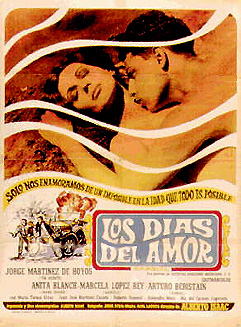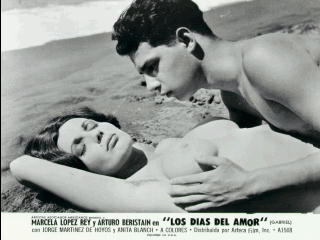 Love]
Love]Los días del amor (Gabriel)
[The Days of
 Love]
Love]
(Artistas Asociados Mexicanos, 1971) Prod Supv: Adolfo Torres Portillo; Coord General: José María Fernández Unsaín; Dir: Alberto Isaac; Scr: Emilio García Riera, Alberto Isaac; Story: Alberto Isaac; Photo: Jorge Stahl Jr.; Music: Raúl Lavista; Prod Mgr: Oscar Magaña; Prod Chief: Armando Espinosa; Sub-Dir: Manuel Ortega; Film Ed: Rafael Ceballos; Art Dir: Lucero Isaac; Decor: Raúl Serrano; Camera Op: Ignacio Romero; Lighting: Antonio Alvarez; Makeup: Ana Guerrero; Dialog Rec: Rodolfo Solís; Music/Re-Rec: Galdino Samperio; Sound Ed: Sigfrido García; Union: STPC
CAST: Jorge Martínez de Hoyos (Vicente Icaza), Anita Blanch (Grandecita), María Teresa Rivas (Fela), Juan José Martínez Casado (Lauro), María Barber (Tina), Arturo Beristáin (Gabriel), Marcela López Rey (Marcela), Héctor Ortega (Gen. Terrazas), Maricarmen Legorreta (Fanny Granados), Luciano Hernández de la Vega (Prof. Granados), Rosalía Orozco (Ruth), Alfredo Portilla and Enrique Silva (Gabriel's friends), Gastón Melo (Moheno), Roberto Dumont (Capt. Machado "Lechuzo"), Alejandra Mora (Marina), Maricruz Nájera (Isaura), Mario Castillón Bracho (captured Cristero), Francisco Zaragoza, Diana & Lety Gaytán, Gabriel Portillo, Livier Valencia, Javier Gutiérrez, Manuel Cedeño, Carlos Hugo Schulte, Salvador Pulido, Federico González, Mario Brizuela, Las Hermanas Vallejo, Teresa Sánchez, Pedro Escobedo, Antonio Moreno, Abel Quezada (Gen. Pacheco), José Luis Cuevas (water vendor)
NOTES: Although Gabriel, the protagonist of Los días del amor, is a few years older than Alberto Isaac would have been at that time (1927), the director admitted that this film was semi-biographical, particularly in its evocation of life in the state of Colima in the 1920s. This is the strong point of the film, since the "plot" is really no more than a series of incidents with several continuing threads: it is a "slice of life" movie, which does not gradually build to a climax that resolves a "problem."
Los días del amor begins with a quote from Joseph Conrad: Isaac's films often begin with either printed quotes or voiceover narration, which lends them a "literary" air. The nostalgic tone of the picture is further enhanced by the period stills which serve as a backdrop to the opening credits. Period costumes, cars, and decoration are all evocative, and there are even two scenes in a movie theatre (the second time, a clip from a Keystone Kops picture is shown).

Gabriel is a teenager who lives in a large house with his uncles Vicente (the municipal president), Lauro (a photographer), and his aunts Fela and Tina. Like most teenagers, Gabriel and his friends are obsessed with sex, but Gabriel's home life is even less conducive than most to understanding "normal" relations between men and women: Vicente's wife left him and is now living with another man; Lauro, married "six or seven" times, takes nude photographs of the local women (his studio is later wrecked by an irate husband); Fela and Tina are spinsters. The Cristero Rebellion is underway, and groups of religiously-inspired guerrillas infest the countryside. General Terrazas arrives to command the local garrison of Federal troops. He brings along his wife, the beautiful Marcela, and Gabriel develops a crush on her. She isn't averse to his attentions (although she constantly forgets his name and even who he is), but her husband is extremely jealous. However, the closest Gabriel gets to Marcela is briefly holding her hand in the movie theatre (her unwitting husband is seated on the other side of them).
Gabriel makes tentative advances to Fanny Granados, a girl his own age, although he fantasizes that she is Marcela. Later, after getting drunk at a wake, Gabriel and a friend go to the local bordello. Gabriel arranges to go to the seaside town of Manzanillo with one of the prostitutes, who somewhat resembles Marcela. His uncle Vicente brings him back. As the film ends, Gabriel and his schoolmates are still focused on the mysteries of the opposite sex.
Los días del amor is a leisurely-paced, decorative film, well-produced and photographed. The performances are all good (the young Beristáin, son of actor Luis Beristáin, would parlay his baby face into a number of similar "sensitive" roles over the next few years), although the most colorful roles are those of Anita Blanch (as Gabriel's shrewd grandmother) and Martínez Casado. Marcela López Rey, an Argentine actress who appeared in some Mexican films around this time, is the very image of languid sexuality.

The Cristero Rebellion serves as the backdrop of the film. Vicente is opposed to the rebels because they represent disorder, but his two sisters at least partially sympathize with the Cristeros' Catholic beliefs ("It just doesn't seem like Sunday without Mass," Fela says--the Catholic Church suspended Mass in protest of the Mexican government's policies). However, the rebels are seen only briefly, as hanging corpses in the opening sequence, as sullen prisoners, and--in a well-staged action sequence--during an assassination attempt on don Vicente in which the municipal president is wounded, his bodyguard killed, and the assassins' car blown to smithereens by their own dynamite.
Los días del amor, although it was the fifth feature-length film directed by Alberto Isaac, could really be considered his first "personal" film, and set the tone for most of his later work. It is pleasant and nostalgic rather than didactic, full of careful touches and nuances.
Note: the print of this film which has been shown on television is missing (obviously) several nude scenes (one shot, of Fanny Granados' bare back as she exposes her breasts to Gabriel, is also missing and renders a whole sequence meaningless).
Los días del amor was nominated for 6 Arieles: Best Actor (Jorge Martínez de Hoyos), Best Co-Starring Actress (Anita Blanch), Best Original Story (Isaac), Best Screenplay (Isaac, Emilio García Riera), Best Music Score (Raúl Lavista), and Best Set Decor (Lucero Isaac). Only Lucero Isaac won in her category, however.
Back to the Alberto Isaac Page.
Review posted 12 May 2001 by dwilt@umd.edu